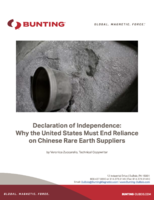NSF International develops eco-efficiency protocol.
Press Release Summary:
NSF Protocol 352 establishes requirements for content of eco-efficiency analyses to ensure consistency, objectivity, and transparency. Eco-efficiency means creating more goods and services while consuming fewer resources and generating less waste and pollution. BASF chemical company is the first to have its Eco-Efficiency Analysis methodology used to evaluate economic and environmental impact of products or processes validated by NSF.
Original Press Release:
New Eco-Efficiency Protocol Developed by NSF International
BASF is the First to Have Eco-Efficiency Analysis Methodology Validated by Independent, Third-Party NSF International
FLORHAM PARK, NJ and ANN ARBOR, MI - NSF International today announced a new eco-efficiency protocol, NSF Protocol 352 (NSF P352), for the validation and verification of eco-efficiency analyses. BASF, the world's leading chemical company, is the first to have its Eco-Efficiency Analysis (EEA) methodology used to evaluate the economic and environmental impact of products or processes validated by NSF, an independent, not-for-profit organization committed to improving and protecting public health and the environment.
Eco-efficiency means creating more goods and services while consuming fewer resources and generating less waste and pollution (source: World Business Council for Sustainable Development Web site). NSF P352 establishes requirements for the content of an eco-efficiency analysis to ensure consistency, objectivity and transparency in all eco-efficiency analyses, which is necessary given the influx of greenwashing. In BASF's case, it also provides a means for verification of BASF's individual EEA study results adhering to the eco-efficiency methodology.
"BASF saw the need to raise the bar for eco-efficiency analysis and looked to NSF and others to help establish the new protocol. We are glad that NSF P352 is now available for widespread adoption, and will help eliminate greenwashing, the act of making a misleading claim regarding the environmental benefits of a product or service," said Edward Madzy, BASF's Director of Product Stewardship and Regulations. "At BASF, we embrace sustainability, and the achievement of being the first company to have an eco-efficiency analysis validated by NSF International demonstrates our leadership in sustainable development practices."
NSF P352 was developed, reviewed and approved by a diverse group of stakeholders from academia, industry and consumer product companies to fulfill the need for an objective and universal method for companies to analyze the sustainability of their products and services. BASF's product stewardship team initiated the development of NSF P352, working in cooperation with NSF International and these other independent organizations, by which BASF's EEA methodology was validated.
BASF's EEA of one of its Joncryl® products, a water-based resin for the printing and packaging industry, is the first study to undergo verification by NSF International for eco-efficiency analysis. For successfully completing these verification processes on both the eco-efficiency tool and for the data relating to the eco-efficiency of its Joncryl product, BASF can use the NSF Mark in literature and marketing materials highlighting the EEA tool and Joncryl. BASF's study results and findings of the verification process are also listed on NSF's Web site. The verifications are valid for three years, after which time the EEA will be re-evaluated and updated.
(Embedded image moved to file: pic15790.jpg) (Embedded image moved to file: pic01723.jpg)
BASF's EEA tool quantifies the sustainability of products or processes throughout the entire life cycle, beginning with the extraction of raw materials through the end of life disposal or recycling of the product. It compares two or more products analyzed from the end-use perspective to obtain comprehensive data on the total cost of ownership and the impact on the environment. The analysis can be applied to all market segments ranging from printing and packaging to automotive. To date, more than 400 studies have been launched or completed internally, as well as with customers, suppliers, and governments, both in North America and Europe.
"NSF shares BASF's commitment to the environment, and we applaud their leadership in helping to develop an intelligent methodology, which provides solutions that improve the environment and the economy," said Bob Ferguson, NSF Vice President.
For more information on eco-efficiency analysis or the new NSF protocol, please contact Patrick Davison, NSF Senior Project Manager, at 734-913-5719 or davison@nsf.org or visit www.nsf.org/business/eco_efficiency/index.asp. For more information on BASF's verifications, please contact Edward Madzy at 973-245-6689 or edward.madzy@basf.com.
Background on the Protocol
NSF provides protocol development for new or innovative products that are not covered by current standards. This protocol was reviewed and approved by a consortium of leading industry and sustainability experts. It provides a means to validate an eco-efficiency methodology and a means to verify specific study results using a validated eco-efficiency analysis methodology. Eco-efficiency analyses rely upon the concepts outlined in the Life Cycle Assessment standards, developed by the International Organization for Standardization (ISO 14040 through 14043). Eco-efficiency analyses evaluate both environmental and economic issues. Additional information can also be found in the NSF P352 Q&A.
About NSF International
NSF International, an independent, not-for-profit organization, helps protect you by certifying products and writing standards for food, water and consumer goods (www.nsf.org). Founded in 1944, NSF is committed to protecting public health and safety worldwide. NSF is a World Health Organization Collaborating Centre for Food and Water Safety and Indoor Environment. Additional services include safety audits for the food and water industries, management systems registrations delivered through NSF International Strategic Registrations, organic certification provided by Quality Assurance International and education through the NSF Center for Public Health Education.
BASF - The Chemical Company. We don't make a lot of the products you buy.
We make a lot of the products you buy better.®
BASF Corporation, headquartered in Florham Park, New Jersey, is the North American affiliate of BASF SE, Ludwigshafen, Germany. BASF has more than 15,000 employees in North America, and had sales of approximately $17.5 billion in 2008. For more information about BASF's North American operations, or to sign up to receive news releases by e-mail, visit www.basf.com/usa.
BASF is the world's leading chemical company: The Chemical Company. Its portfolio ranges from chemicals, plastics and performance products to agricultural products, fine chemicals, as well as oil and gas. As a reliable partner, BASF helps its customers in virtually all industries to be more successful. With its high-value products and intelligent solutions, BASF plays an important role in finding answers to global challenges, such as climate protection, energy efficiency, nutrition and mobility. BASF has approximately 97,000 employees and posted sales of more than 62 billion in 2008. BASF shares are traded on the stock exchanges in Frankfurt (BAS), London (BFA) and Zurich (AN). Further information on BASF is available on the Internet at www.basf.com.




